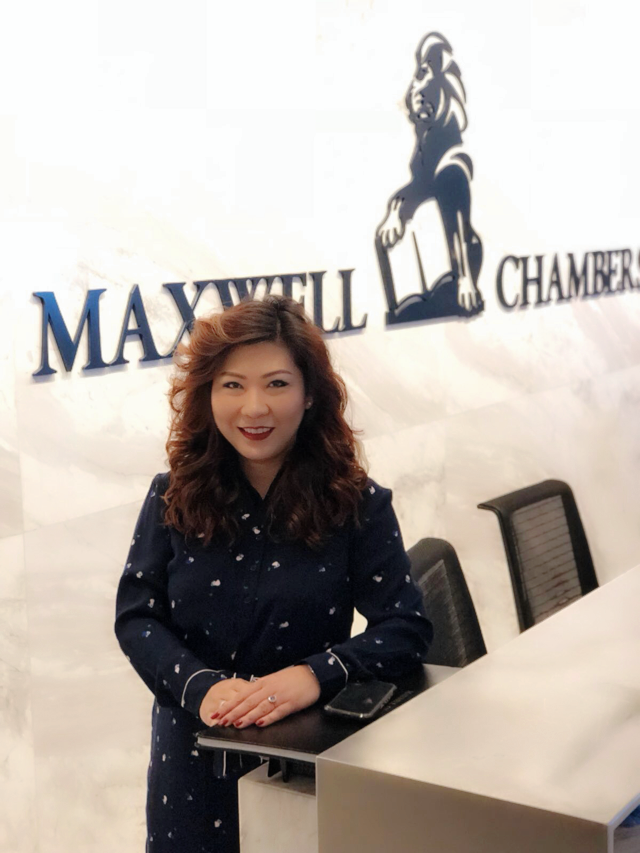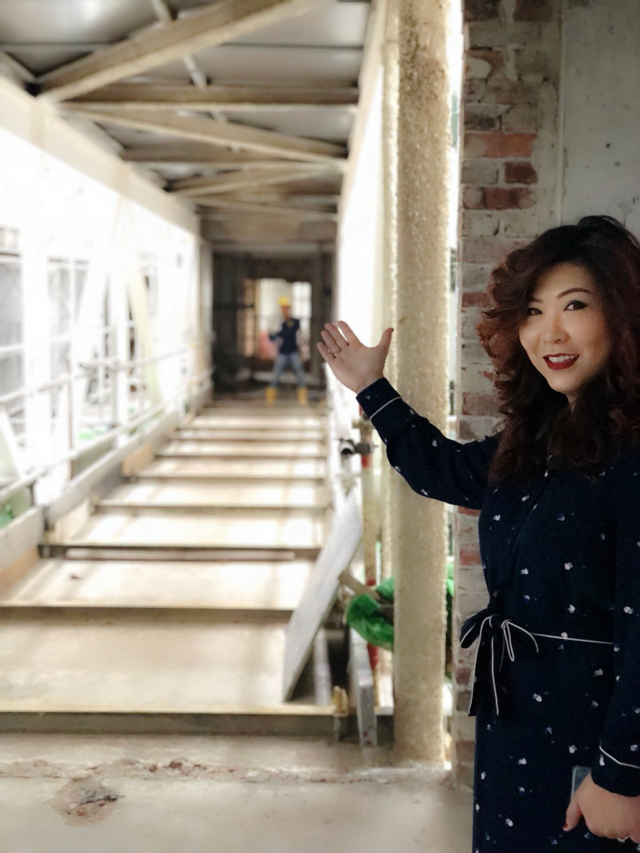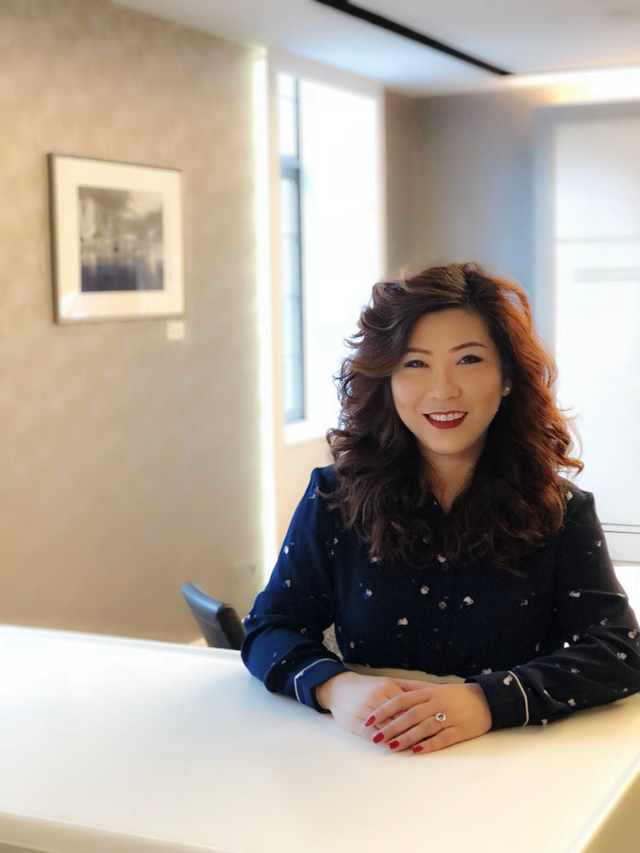By Darren Teoh
When the Singapore Law Review caught wind that Maxwell Chambers was entering a phase of expansion, we were interested in finding out what the future holds for one of the world’s leading Alternative Dispute Resolution (“ADR”) facilities. The Chief Executive of Maxwell Chambers, Ms Katherine Yap, kindly agreed to a sit-down conversation about both the road travelled, and the way ahead for Maxwell Chambers.
Ms Katherine Yap, the Chief Executive of Maxwell Chambers.
When Ms Yap first began work at Maxwell Chambers as the head of communications & customer relations, the complex was still in its infancy. She joined four other colleagues in fostering the growth of the complex, when the idea of a specialised location for ADR was still relatively novel in Asia. Ms Yap recalled that the team faced issues getting manpower and improving work processes to ensure that operations ran smoothly in preparation for the complex’s opening.
As there were no seasoned members from the ADR scene on the pioneering team, ideas were borrowed from the hotel context and adapted for Maxwell Chambers, such as a lounge where clients can have coffee and relax on comfortable couches. In 2010, Maxwell Chambers was officially established as the world’s first one-stop dispute resolution hub, offering both hearing facilities as well as international dispute resolution institutions for the convenience of visiting legal practitioners.
Nine years on, Ms Yap has ascended to the position of Chief Executive, bringing with her the same vision she had from the start: for Maxwell Chambers to be the world’s top dispute resolution hub. Maxwell Chambers has received rave reviews despite its relatively short history, with the Guide to Regional Arbitration 2017 having specifically described the facilities at Maxwell Chambers as “incredible”. The Chambers have also registered a steady growth in the number of ADR cases held on the premises over the years.
Ms Yap introduces the Lounge - a favourite feature of Maxwell Chambers among Clients.
The Secrets of Success – how and why Maxwell Chambers shines
Ms Yap is of the view that Maxwell Chambers’ present achievements are due to a combination of factors. Chiefly, both management and staff are meticulous in rendering services to clients. For instance, although all hearing rooms in Maxwell Chambers are acoustically-treated, the customer relations staff taken further care to arrange rooms for breakout sessions. These sessions allow parties to meet their respective lawyers for discussions in physically distant locations, so as to provide an assurance of the confidentiality of each session.
Moreover, Ms Yap believes that the personalisation of services rendered can explain why clients have become Maxwell Chambers’ repeat customers. She mentioned that customer relations staff will go the extra mile to provide excellent customer service, such as catering to special requests for food and beverage. Another example which Ms Yap raised was Maxwell Chambers’ cultivation of strong relationships with hotels in the vicinity so that its foreign clients could enjoy preferential accommodation rates when they visit Singapore for ADR proceedings.
Additionally, Ms Yap feels that the team is diligent in keeping up with the latest technology and corporate knowledge to tailor its facilities for legal professionals. Her own personal decision to obtain certification as a mediator clearly reflects the critical value placed on industry knowledge, and the role that it plays in Maxwell Chambers’ business. Ms Yap also highlighted that she also embraces fresh ideas from younger employees, as they are often more in-tune with changing expectations around customer service than she is.
Finally, Maxwell Chambers is the first ADR complex which has taken a decisive step towards the technologization of various services provided to its clients, otherwise known as the “Smart Maxwell” initiative. Their aim is to boost productivity, meet the growing demand for hearings, and incur significant time and cost savings with the adoption of smart technology. She also predicted that other ADR complexes are likely to follow suit given the publicity given to “Smart Maxwell”, and thus technologization in particular ought not be seen as a panacea to all of the complex’s business challenges.
We probed Ms Yap further on what the technologization of Maxwell Chambers would look like, which she had earlier mentioned as one of the factors explaining the Chambers’ success.
Ms Yap shared that Maxwell Chambers is still on its journey towards becoming a “smart” hearing complex and that she is excited to roll out the upcoming developments by the end of this year. Maxwell Chambers’ destination in this regard is clear: through a mobile application, clients will be able to make room bookings, view amenities in the vicinity, and request for secretariat services including sending orders for printing. With a touch on their mobile devices, clients will even be able to control the room settings through their handphones, such as changing the brightness and temperature of the rooms.
Looking ahead, the most charming technological addition to Maxwell Chambers is arguably “Max”, a robot that will bring documents and food orders to individual rooms in place of customer relations staff. “Max” is fully-integrated with the aforementioned mobile application, which seamlessly communicates to the client's mobile device and application when "Max" arrives with a delivery.
Technologization brings about multiple benefits to Maxwell Chambers. Ms Yap readily brought three examples to mind. First, as the mobile application will substitute key cards in maintaining access control to rooms, the frequent occurrence of the loss of key cards would cease. This would obviate the need for ad-hoc replacements. Second, customer relations staff can minimise travelling to and from hearing rooms as they can take instructions remotely upon a client’s request for services through the mobile application. Thirdly, real-time billing through the mobile application will cut down the time required to tabulate the total charges incurred by the client during their time at the facility.
Although technology improves both the efficiency and effectiveness of the services that Maxwell Chambers provides to its clients, Ms Yap observes that there is a need to ensure that technologization does not result in a loss of the “personal touch” that she attributes the success of Maxwell Chambers to. That is why even after the mobile application’s deployment, Maxwell Chambers will seek to uphold the high standards of professionalism of its customer service.
Entering the Second Phase of Development – Maxwell Chambers Suites and Beyond
Ms Yap explained that the increase in the number of foreign practitioners seeking to conduct ADR hearings at Maxwell Chambers, as well as the desire of current institutional partners to expand, drove the management team to search for additional space.
Eventually, the building at 28 Maxwell Road where the Red Dot Traffic Building used to be situated, was selected. This was because the Red Dot Traffic Building’s lease was running out, and the location was sufficiently proximate such that a link-bridge could be. The link bridge is, in fact, currently being built to connect Maxwell Chambers’ main building to the new Maxwell Chambers Suites. As our curiosity about the link bridge was evident to Ms Yap, she offered us a glimpse of the “work-in-progress”.
Construction works are currently undergoing to install a link bridge between the main building of Maxwell Chambers and the new wing within the complex, Maxwell Chamber Suites.
Ms Yap elaborated that on top of the link-bridge built between the main building and Maxwell Chamber Suites, the construction of a sheltered walkway from Tanjong Pagar MRT to the main building is work-in-progress. The completion of both construction projects will fully weather-proof access to the entire complex.
When it opens in 2019, Maxwell Chambers Suites will house 50 office spaces for dispute resolution institutions, law firms and chambers. All hearing rooms will be situated in the main Maxwell Chambers building.
Concluding Thoughts
Ms Yap is pleased that Maxwell Chambers had not received any complaints regarding customer service since Maxwell Chambers opened its doors. She hopes that Maxwell Chambers never stagnates, and that both management and staff will continue to set their sights high as Maxwell Chambers competes to emerge at the forefront of the business.
Ms Yap, poised and confident in the future development of Maxwell Chambers.
The Singapore Law Review would like to thank Ms Katherine Yap and the staff of Maxwell Chambers, who have kindly invited our members, Perry Peh and Darren Teoh. It has been a wondrous opportunity to speak with them and immerse in the growth of the Chambers as the cornerstone of Singapore's arbitration scene.




